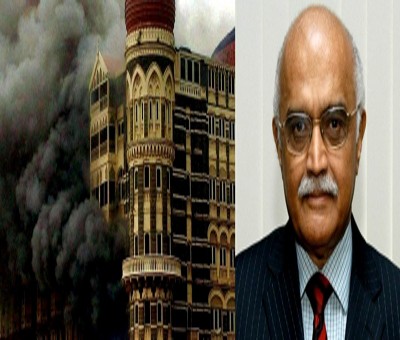
Mumbai, Today, 14 years have passed since the dastardly Mumbai terror strikes by 10 Pakistani gunmen for 60 hours on November 26, 2008, but the report of a high-powered probe panel remains buried in the �classified section of the officialdom.
The inquiry was conducted by the late Union Home Secretary Ram D. Pradhan -- who died in July 2020 -- and retired IPS officer Vappala Balachandran, presently in the USA, into the police response to the deadly terror strikes and their fallouts.
"The report we have prepared was �classified' by the then Maharashtra government� I feel it was unnecessary as the people had the right to know what we had recommended," Balchandran told IANS.
In all, the committee had made around 27 recommendations, and suggested measures to improve the intelligence processing and action, said the former RAW officer.
However, though the then Chief Minister Ashok Chavan was keen to release the probe report, submitted in April 2009, suddenly it was treated as a �top secret' and �classified' without assigning reasons.
Instead, the Congress-Nationalist Congress Party (NCP) government tabled an Action Taken Report of just five paras -- on the 100-page dossier submitted by Pradhan-Balachandran!
This naturally resulted in tumultuous scenes in the Legislature with the then Opposition Bharatiya Janata Party-Shiv Sena and others demanding that the full report should be tabled in the house, but the government did not oblige.
"The ATR was released without indicating why we had made all those recommendations, and to understand them fully, I feel it was necessary to table the entire report, not just a part of it," pointed out Balachandran.
Officials in the know then had hinted at alleged �pressures' from various quarters and apprehensions that, if made public, the probe report could affect the reputation and morale of the police force.
Though nobody is willing to reveal the exact recommendations made by the Pradhan-Balachandran panel, speculation is rife that it may contain some points that may not be laudatory to the then top officials, especially since certain high-ranking police officers had lost their lives in the battle with the terrorists.
Significantly, the panel's brief was to examine the possible lapses of the Mumbai Police while reacting to the 26/11 strikes, how and why they failed to adequately meet the challenge, the intelligence received on the attacks, whether it was reliable and taken seriously with follow up, etc., and make its recommendations to prevent similar disastrous situations in future.
Using his experiences as a super-spy, Balachandran scoured through the Police Control Room logs to find nearly 400 calls received, with intelligence reports pointing at the possibility of a �sea-borne' terror strike in Mumbai, and more inputs from New Delhi, Assam and other places.
Though a few alert senior officers took some of the tips gravely and even went to caution one or more of the premises that could be potential targets, the state government did not convene any meeting but chose to intimate the persons concerned via SMS!
Balachandran feels it was a serious lapse on the part of the state government as it did not react or act in time on the secret intelligence received from various quarters.
He averred that if the Maharashtra authorities had indeed bothered to alert the Indian Navy or Indian Coast Guard, and if they had started vigil in the sea and coasts, the hijacking of the fisherboat Kuber could probably have been avoided and the 26/11 strikes would never have taken place.
Dismissing the contentions in some circles that the Pakistani desperadoes may have got logistic support from locals, Balachandran rued how even the Centre did not formally probe the riposte of the central agencies to ascertain what exactly went wrong, how and where.
A security specialist, Balachandran has penned several articles and books like the gripping �Intelligence Over Centuries' and �Keeping India Safe'.


.jpeg)

